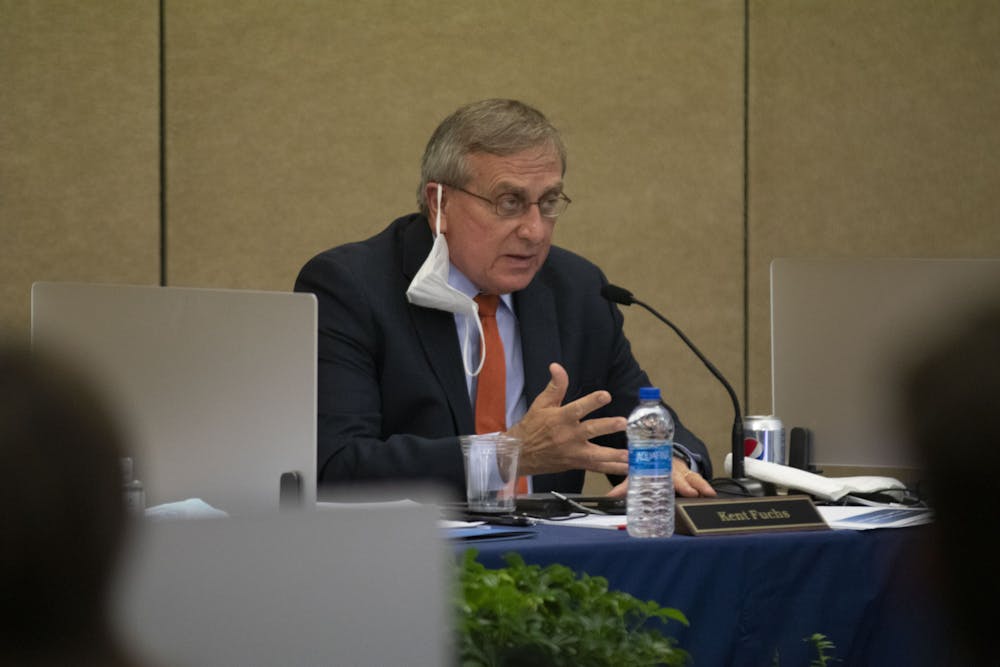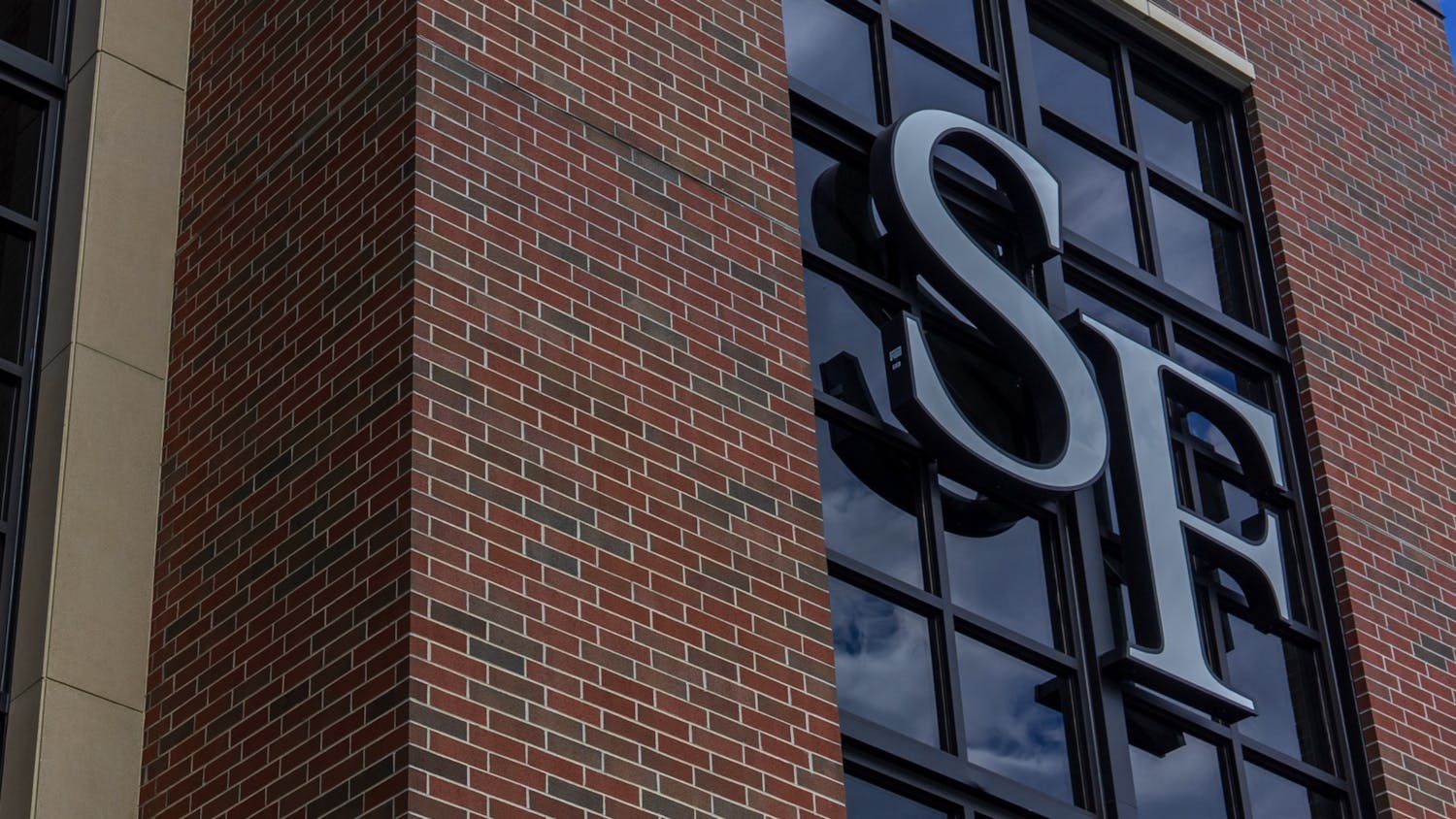The University of Florida is entering a new age of executive leadership, but the state’s current legislative session has come to a close causing the upcoming presidential appointment to operate behind closed doors unlike the last appointment.
On March 4, Senate Bill 520 passed and the order was enrolled. It was signed by the officers and presented to Gov. Ron DeSantis Monday.
UF President Kent Fuchs announced his resignation Jan. 5 in a campus-wide email and video message. The search for UF’s next leader is expected to begin this month, UF spokesperson Hessy Fernandez wrote in an email.
Senate Bill 520 and its companion bill, House Bill 703, will keep the identities of presidential candidates out of public records for most of the process. Students and faculty will be able to research and meet with finalists 21 days before a new campus leader is chosen.
President Fuchs’s appointment in 2014 didn’t have this shield around it.
In previous appointments, the process was subject to the public eye, but Florida’s senators and representatives passed a bill that will delay the release of information identifying the potential candidates.
Any information, including recordings from meetings, disclosing such information will be exempt from public records requests.
The law puts a restraint on the public’s access to information, and the lack of information will have a negative impact on the candidate’s success, Paul Ortiz, president of the United Faculty of Florida at UF, said.
“Their attempt to try to keep this more secretive is really going to hamper the climate of trust that an incoming president needs,” Ortiz said.
From the very beginning, Fuchs was well known because people could look at his previous record before he ever received the appointment, Ortiz said. Fuchs’ appointment was very interactive, he said.
People were able to get to know who he was, and the availability of information helped Fuchs hit the ground running at the start of his presidency, he said.
“[The bill] is really setting up the next cord of presidents in Florida throughout the state to have challenges their predecessors didn’t have,” he said.
At Florida’s public universities, Ortiz said, the incoming president is going to rely heavily on the goodwill of residents to be successful in their tenure. Taking away the public’s ability to know the candidates makes it harder for them to gain public support, he said.
During the previous presidential appointment, the final candidates were narrowed down to Fuchs, who was provost of Cornell University at the time, and David McLaughlin, who was provost of New York University at the time.
Because of the transparency, Ortiz remembers seeing how Fuchs had significant classroom experience, which showed Fuchs knew what it meant to work with students. Ortiz believes this is the most important quality for an incoming president.
“The core thing of our campus at UF is undergraduate teaching,” he said. “[If] the person leading the place doesn’t understand at a very intimate level what happens in a classroom, they’re not going to be able to understand what our university is all about.”
He did not have to see Fuchs' evaluations– seeing his background in education gave him confidence that Fuchs was a suitable candidate, Ortiz said.
UF specified the search committee sought “a president with a distinguished academic career and one with the vision, experience, credentials, integrity, energy and determination to achieve the university’s goal of becoming a top 10 public research university,” Richard Yost, a chemistry professor who served on the 2014 search committee, wrote in an email.
He recalled all the candidates had distinguished academic backgrounds.
It can be difficult to get current university presidents and provosts to apply knowing that their current employer may not be pleased with them looking elsewhere, he wrote.
“The current discussion about some exemptions from the sunshine law may make it easier for such candidates to be considered, improving the potential candidate pool,” he wrote.
Ultimately the committee felt Fuchs best met the qualifications because he had a reputable career, Yost wrote, and had demonstrated the leadership and commitment to innovation that the committee felt would be key to reaching the university’s goal of reaching top 10.
He exhibited the passion and people skills that would make him a successful president, he wrote.
“And the last eight years has demonstrated that we were correct in that assessment,” he wrote. “President Fuchs has graduate degrees in both electrical engineering and divinity, a rare combination of technical and humanistic training.”
Having a president who truly understands the students and the culture of the university is important to the student body as well.
Fuchs' effort to be involved in student life did not go unnoticed. Randy Rankin, a 21-year-old industrial engineering major, remembers how before COVID, Fuchs would drive around in a golf cart and drop students off at class.
This is one of the many ways Fuchs connected with the students on campus. The attention to students is a quality Rankin said he hopes to also see in the future president.
Additional qualities that would be desirable for UF’s future president include a person who is focused on diversity efforts at the institution and making resources more accessible, Stephanie Odom, a 20-year-old political science sophomore, said.
Odom said if students were able to hear debates between the potential candidates, it would allow them to be more involved in the process and have more of an input on their future leader.
“We’re all very ambitious and driven here and we know the culture of the school, so we want a president that is in touch with that as well,” she said.
Contact Elena Barrera at ebarrera@alligator.org. Follow her on Twitter at @elenabarreraaa.

Elena is a second-year journalism major with a minor in health sciences. She is currently the University Administration reporter for The Alligator. When she is not writing, Elena loves to work out, go to the beach and spend time with her friends and family.






